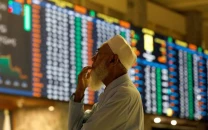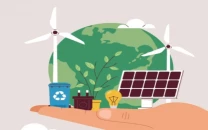Talking business
Power subsidies may make for convenient politics but nobody is willing to pay for them.

A train of statements continues from creditors reminding us that we must see through tax and power sector reforms in order to be considered creditworthy again. Power subsidies may make for convenient politics but nobody in the world, not even our own taxpayers, are willing to pay for them.
Numbers disclosed this week show that this fiscal year alone could see tariff differential subsidies climb to Rs220 billion, for instance. Somebody will have to foot this bill and there are only two takers for it: you and me. The only choice we have is whether we pay it via taxes, or through our electricity bills.
Power sector reform is a complex business. Not for nothing that is has been stuck for so long. The trick for the government now is to make happen in a matter of months something that other governments have not been able to do in years.
Unbundling the Pakistan Electric Power Company (Pepco) is only the first step. Next comes empowering the distribution companies with autonomous boards, granting the National Electric Power Regulatory Authority (Nepra) the power to set tariffs on its own, and withdrawing subsidy payments.
Then there is the question of tariff reform. Finance ministry estimates suggest a hike of up to 40 per cent may be required this fiscal year to completely pass through the tariff differential subsidy to consumers. This can be mitigated slightly by increasing gas allocations to the power sector, but gas sector politics have proven too much for the government to handle.
Last year’s winter gas allocation plan and the energy summit have both made commitments to increase the supply of gas to the power sector, yet our plants are chugging away mostly on furnace oil. Of course, to increase their allocations of gas you need to take it away from someone else.
Diverting it away from the fertiliser sector means price hikes of the essential input into agriculture, the livelihood of our political elite. Withdrawing gas from industry means strikes and shutdowns, difficult to stomach at a time when industry support for tax reform is also required. Withdrawals from compressed natural gas (CNG) stations translate into long lines of irate consumers and CNG associations making a hue and cry.
So how will they do it this time? Or will we have to bear the full brunt of the tariff hike? Let’s find out.
The other peg on which our creditworthiness is hanging is tax reform as highlighted by Adnan Mazari during the week. We are told that the reformed general sales tax (GST) legislation is being drafted and will be placed before parliament on October 22. We are also told that the pesky issue with Sindh has been sorted out by giving the province the right to collect all GST on services.
But the question is, what exactly does the IMF want on this front in order to kick-start the 5th review under the stalled standby arrangement? Is it enough to place the legislation before the parliament? Or do they want to see it being passed before agreeing to disburse the balance amount? Apparently, nobody knows since the topic has not really been broached with the lending body.
Our finance team is working on an assumption. And the assumption is that placing the legislation before parliament will be enough to satisfy the IMF that tax reform is on the way.
As with power sector reforms, what is being worked on currently is only the first step in a long process. Actual passage of the legislation is another important step and then comes the implementation stage.
The refunds software, central to the performance of the reformed tax, is experiencing ‘teething problems’ and getting that sorted out is a bigger job than one might think, most industry taxpayers believe.
So are we in or out of the IMF? It appears efforts are being made to stay inside the programme, but either the Fund is going to have to loosen up somewhat, or we are going to have to find a way to make things happen without support from creditors.
The writer is Editor Business and Economic policy for Express News and Express 24/7
Published in The Express Tribune, October 11th, 2010.



















COMMENTS
Comments are moderated and generally will be posted if they are on-topic and not abusive.
For more information, please see our Comments FAQ